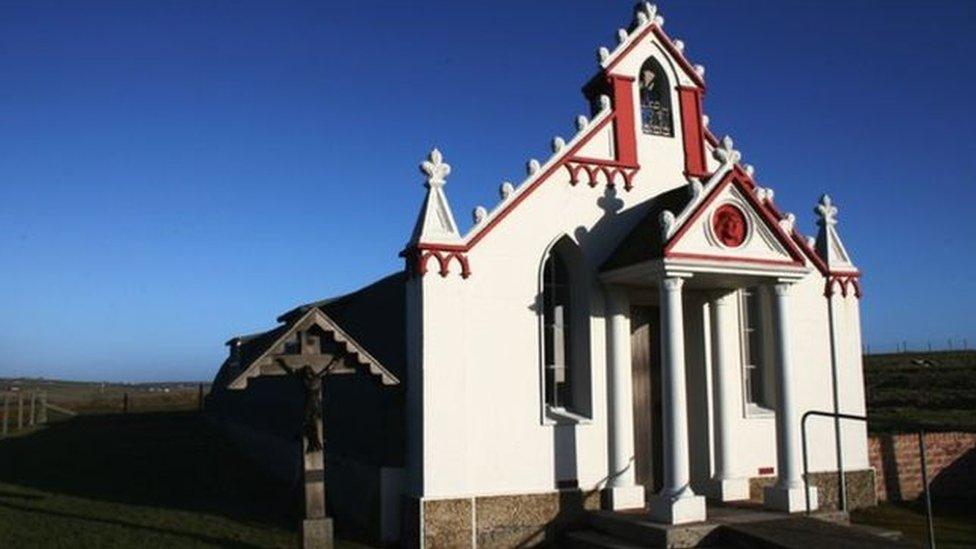The Italian prisoners who found 'escape' in football
- Published

Gino (second from left, standing) was the left-winger for the Camp 34 team
Coriolano "Gino" Caprara is the last surviving Italian prisoner of war to have been held in the Orkney Islands during World War Two. Now aged 100, he has been recalling how football came to play an important role in camp life.
"I played for the Camp 34 team against the soldiers. We always played tournaments - and we always lost!"
Gino was a prisoner on the island of Burray from 1942 until 1945.
He arrived on Orkney at the age of 25 after being captured in North Africa.
Italy surrendered to the Allied forces in 1943, but the 1,000 men being held in the two camps in Orkney could not be returned to their native country because of Nazi Germany's influence in the region.
That meant the prisoners had to stay in the camps until the end of the war.

The Camp 60 team which played in the match in August 1944
Author Donald S Murray said their presence was troubling for many Orcadians, whose relatives were themselves being held in prisoner of war camps.
"I was told stories of them being attacked in the street," he recalled.
As relationships improved between the military leaders and prominent figures among the prisoners, a degree more freedom was granted - the freedom to work, to socialise, and eventually to host leisure activities in the camps.
Local farmers received help in gathering crops, something Donald says the prisoners "loved" doing.
"There was a prisoner who worked on a farm and ended up weeping after he had a meal in their house. He started saying 'like my family, I am people again'," he said.
In April 1944 the prisoners formed what was known as an Italian Labour Battalion. They were no longer escorted by armed British guards, and were given free time in the evenings and Sundays off.
The prisoners helped to build the Churchill Barriers, a series of sea defences, as well as creating the Italian Chapel. This ornate chapel was fashioned from two Nissen Huts and a concrete facade.

The prisoners built the Italian Chapel using two Nissen huts and a traditional facade
As the PoWs became more ingrained in everyday Orkney life, sport became an increasingly important part of life in the camps.
In August 1944 the Italians organised a sports day at Camp 60, and a delegation was allowed to travel from Camp 34 to take part. Gino said he came first in the high jump.
There was also a football match, which the weekly POW newspaper, Notiziario Dai Campi, described as a contest "for the not-so-young".
The players were described as demonstrating "the speed of snails, internal pains, and feet in the air" which got "healthy laughter from the spectators". The match ended with a 2-0 win for the Rossi over the Verdi.
The prisoners also played against local teams.

The teams were praised for their entertainment value
Speaking in 1992, local man John Rosie recalled being impressed at the Italians' presence on the pitch when he played against them.
"They were very good footballers - naturally I don't remember names now, but the ones you remember best are the ones that kicked you hardest.
"The first time I saw an overhead kick was by the Italians, that's how it was introduced to Orkney.
"Good players, but a bit quick in the temper too."

Finding their range - two Italian boxers compete in the sports day
When asked about the football team, Gino said they had some "fantastic" players.
"One of our forwards was really clever. He was against a British soldier, who was very fast, in a match.
"So the British soldier ran past him and our striker says (in Italian) 'Oh basta'!"
The game was stopped because the soldiers thought he had sworn at them in a show of disrespect.
"But what he actually said in Italian was 'Oh, enough!" Gino laughed.
"We explained what happened, but we were shaking."

The sports day drew a crowd of PoWs and British soldiers
Donald S Murray believes that playing football and building the chapel were important forms of escapism for the prisoners.
"If you're imprisoned, artistry of any kind provides that means of escape from reality," he said.
"It's the right to dream expressed on the football field, pretending to be your footballing hero for five minutes."
Gino said the chapel and football had also provided emotional connections to his home while he was in the camp.
He has returned to Orkney a number of times to visit the Italian Chapel and the friends he has made in the intervening years.
And a number of Orcadians were represented at his 100th birthday celebrations earlier this year.